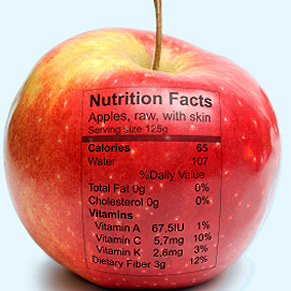Some of health benefits of apples are listed below.
Apples Lower Cholesterol
One medium-sized apple contains about four grams of fiber. Some of that is in the form of pectin, a type of soluble fiber that has been linked to lower levels of LDL or “bad” cholesterol. That’s because it blocks absorption of cholesterol, according to WebMD, helping the body to use it rather than store it.
Apples Keep You Full
Apple’s wealth of fiber can also keep you feeling full for longer without costing you a lot of calories — there are about 95 in a medium-sized piece of fruit. That’s because it takes our bodies longer to digest complex fiber than more simple materials like sugar or refined grains. Anything with at least three grams of fiber is a good source of the nutrient; most people should aim to get about 25 to 40 grams a day.
95 in a medium-sized piece of fruit. That’s because it takes our bodies longer to digest complex fiber than more simple materials like sugar or refined grains. Anything with at least three grams of fiber is a good source of the nutrient; most people should aim to get about 25 to 40 grams a day.
Apples Keep You Slim
One component of an apple’s peel (which also has most of the fiber) is something called ursolic acid, which was linked to a lower risk of obesity in a recent study in mice. That’s because it boosts calorie burn and increases muscle and brown fat, Huff Post UK reported.
Apples Prevent Breathing Problems
Five or more apples a week (less than an apple a day!) has been linked with better lung function, Health magazine reported, most likely because of an antioxidant called quercetin found in the skin of apples (as well as in onions and tomatoes), the BBC reported.
And the breath benefits of apples extend even further: A 2009 study found that women who eat plenty of the fruit are less likely to have children with asthma.
Apples Fight Colds
While they don’t quite rival oranges, apples are considered a good source of immune system-boosting vitamin C, with over 8 milligrams per medium-sized fruit, which amounts to roughly 14 percent of your daily recommended intake.
 Apples May Fight Cancer
Apples May Fight Cancer
In 2004, French research found that a chemical in apples helped prevent colon cancer, WebMD reported. And in 2007, a study from Cornell found additional compounds, called triterpenoids, which seem to fight against liver, colon and breast cancers.
Apples Decrease Diabetes Risk
A 2012 study published in the American Journal of Clinical Nutrition found that apples, as well as pears and blueberries, were linked with a lower risk of developing type 2 diabetes because of a class of antioxidants, anthocyanins, that are also responsible for red, purple and blue colors in fruits and veggies.
Apples Boost Brain Power
The fruit has been linked to an uptick in acetylcholine production, Good Housekeeping reported, which communicates between nerve cells, so apples may help your memory and lower your chances of developing Alzheimer’s.
